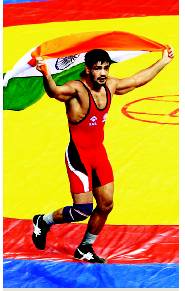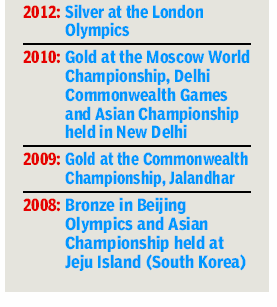Sushil Kumar, wrestler
| Line 31: | Line 31: | ||
Rajiv Tomar adds: You need more speed on the mats. In mud, you wrestle for 25-30 minutes while the same is over in two minutes on the mat when you have to take the point. The smaller the bout, the faster it is. | Rajiv Tomar adds: You need more speed on the mats. In mud, you wrestle for 25-30 minutes while the same is over in two minutes on the mat when you have to take the point. The smaller the bout, the faster it is. | ||
| + | =2008= | ||
==Beijing Olympics 2008== | ==Beijing Olympics 2008== | ||
''' After he lost his match in the 2008 Olympics ''' | ''' After he lost his match in the 2008 Olympics ''' | ||
| Line 49: | Line 50: | ||
Rajiv Tomar points out that there was no daal-roti in Beijing, so the Indian wrestlers used to have pizza almost every day. Pizza khaake medal jeeta hain (We won a medal after a diet of pizza). | Rajiv Tomar points out that there was no daal-roti in Beijing, so the Indian wrestlers used to have pizza almost every day. Pizza khaake medal jeeta hain (We won a medal after a diet of pizza). | ||
| + | =2010= | ||
==Moscow 2010: a few millions to lose the finals== | ==Moscow 2010: a few millions to lose the finals== | ||
''' I was offered cash to throw world meet final: Sushil ''' | ''' I was offered cash to throw world meet final: Sushil ''' | ||
| Line 69: | Line 71: | ||
Among his supporters cheering him on was Jabrail Hasanov, his semifinal opponent from Azerbaijan whom Sushil had beaten 4-3. “I have participated in four or five world championships, but the support I received in Moscow in 2010 was commendable. To beat a home wrestler in a country with a strong wrestling base is not an easy task,” Sushil recalled. | Among his supporters cheering him on was Jabrail Hasanov, his semifinal opponent from Azerbaijan whom Sushil had beaten 4-3. “I have participated in four or five world championships, but the support I received in Moscow in 2010 was commendable. To beat a home wrestler in a country with a strong wrestling base is not an easy task,” Sushil recalled. | ||
| − | ==London Olympics 2012== | + | =2012= |
| + | ==London Olympics 2012== | ||
''' On the difference between Beijing and London Olympics ''' | ''' On the difference between Beijing and London Olympics ''' | ||
| Line 98: | Line 101: | ||
Sushil follows and play football. | Sushil follows and play football. | ||
| + | |||
| + | =2018= | ||
| + | [https://epaper.timesgroup.com/Olive/ODN/TimesOfIndia/shared/ShowArticle.aspx?doc=TOIDEL%2F2018%2F08%2F18&entity=Ar02303&sk=6CABA897&mode=text August 18, 2018: ''The Times of India''] | ||
| + | |||
| + | '''As in July 2018''': | ||
| + | |||
| + | The twotime Olympic medallist is returning to the Asiad after skipping the last two editions in 2010 and 2014. The only time he participated in Asiad, he ended up winning a bronze in Doha (2006). At 35, Sushil showed glimpses of his pace and skills winning gold at the Gold Coast CWG. However, his build-up to the Asiad was marred by a 4-8 defeat to a Polish grappler, Andrzej Piotr Sokalski, at the Tbilisi Grand Prix last month. Sushil has been training in Georgia for the Asiad | ||
Revision as of 21:13, 12 September 2018
This is a collection of articles archived for the excellence of their content. Readers will be able to edit existing articles and post new articles directly |
Contents |
Sushil Kumar, wrestler
IN BEIJING, he HAD RESIGNED TO LIFE OF WRESTLING IN DANGALS
TEAM TOI
Rohan Puri The Times of India 2013/08/23
On the transition from the mud akhadas to the modern mats for Indian wrestlers
Sushil Kumar says: Base humara mitti mein hi tikta hain. (Our basics take shape from wrestling in the mud). The facilities have improved in our village (Baprola) especially after Beijing Olympics in 2008. Now, even the small centres have mats. But we still train in mud once a week. The main difference is that your speed is reduced when wrestling in mud.
[Olympian Rajiv Tomar (Beijing, 120kg) ] has been our Bhaarat Kesri for ten years now. He’s the real champion of mud wrestling.
Rajiv Tomar adds: You need more speed on the mats. In mud, you wrestle for 25-30 minutes while the same is over in two minutes on the mat when you have to take the point. The smaller the bout, the faster it is.
2008
Beijing Olympics 2008
After he lost his match in the 2008 Olympics
The top five or six wrestlers in his category (66kg, freestyle) were almost head to head. So (after the defeat), he took off his shoes and told his team, “Ki bas. Ab toh dangalon ki tayyari karenge (It’s all over, let's start preparing for the dangals back home).”
Then the second chance came with the repechage. His coach and guruji came over and told him, ‘Another chance has come your way. Give it all you’ve got. he gave it his best and the result was good.
His daily training regime in times when there is no tournament
The training remains the same. he had a shoulder injury which was troubling him for the past year. It was during the Olympics and even during the qualifiers prior to that. When he resumed training after London, he aggravated it. Everyone decided it's best to give it some rest as there was no major tournament in the period. His left shoulder had gotten thinner than the right. It was a funny sight. It's fine now am back to full time training.
He is a vegetarian and that makes his diet different from other top wrestlers in the world.
he says that he is rough and tough. he eats what he is given. This prepares him for different situations.
Rajiv Tomar points out that there was no daal-roti in Beijing, so the Indian wrestlers used to have pizza almost every day. Pizza khaake medal jeeta hain (We won a medal after a diet of pizza).
2010
Moscow 2010: a few millions to lose the finals
I was offered cash to throw world meet final: Sushil
Ritu Sejwal TNN The Times of India 2013/08/23
Double Olympic wrestling medallist and former world champion Sushil Kumar told The Times of India that he was approached to throw the championship bout at the 2010 world meet in Moscow.
As Sushil prepared for his final against Russian Alan Gogaev, a member of his entourage came up to him and said, “Sushil, kushti ke liye keh rahe hai (They want to talk about the bout).”
Recalled Sushil. “The money offered was a few crores. For a wrestler, it was really good money. The offer was communicated to one of our foreign coaches. The event was taking place in Russia and my final opponent was a Russian. It’s our country so our player should win — that’s what they seemed to want.”
Sushil promptly demolished Gogaev 3-1 . “It was not a matter of two-four crores. Hamari bhi izzat ki baat thi (it was a matter of honour).”
Sushil went on to win India's only world championship wrestling gold medal.
Sushil recalled how he was humbled by the reception he received from the crowd after the final win in Moscow. “As I climbed down from the mat, I looked up and remembered noticing that there was no one sitting. Everyone in the stadium was giving me a standing ovation. It was most humbling,” said Sushil during a free-wheeling chat.
Among his supporters cheering him on was Jabrail Hasanov, his semifinal opponent from Azerbaijan whom Sushil had beaten 4-3. “I have participated in four or five world championships, but the support I received in Moscow in 2010 was commendable. To beat a home wrestler in a country with a strong wrestling base is not an easy task,” Sushil recalled.
2012
London Olympics 2012
On the difference between Beijing and London Olympics
Sushil feels that ‘It was a difference of silver and bronze, nothing more. During London the federation helped the Indian wrestlers a lot. They provided him with whatever he wanted. They just said we will give you whatever you want, but you have to win a medal for the nation. It wasn’t so in Beijing.
The coach Raj Singh, Vinodji, his younger brother Amarjeet was there, and his physio too. the Indian wrestlers had trained in the US so they helped the team a lot in London. The American wrestler was ousted in the opening round, so they left Sushil and began helping him out, backing him to get fit, to get him a medal.
They gave him a lot of advice, checked his movements.
Does he have sleepless nights over an important bout the next day
Sushil feels that This happens when your performance is down. But in London, his performance was at its peak. The Indian wrestlers had trained at Colorado Springs for 15 days and then participated in a tournament over there. He defeated everyone without conceding a single point. Everyone said that he was sure to win an Olympic gold.
On money
In the dangals, on mud, he earns around Rs 5, 6 lakh per bout. As he grew, his coach kept him away from mud and trained him on the mat since you can win medals only through that. Those who succeed on the mat, stay on the mat.
Of traditional wrestling matches
Sushil points out that at a traditional wrestling centre like Belgaum even today, you will see a crowd each day. You won’t get tickets to watch even. But in the North, there is hardly any publicity. People don’t know from where to buy the tickets or if they are available, however the entry is usually free. During the Commonwealth games, the stadiums were full.
He adds: These days, in the rural areas even women can tell when there is a point or if there is a foul. Even the Dangals today have the points system to determine winners. They have realised that point system pey result pukka niklega.
The Rajiv Gandhi Gold Cup benefits the players, they earn money.
Other sports
Sushil follows and play football.
2018
August 18, 2018: The Times of India
As in July 2018:
The twotime Olympic medallist is returning to the Asiad after skipping the last two editions in 2010 and 2014. The only time he participated in Asiad, he ended up winning a bronze in Doha (2006). At 35, Sushil showed glimpses of his pace and skills winning gold at the Gold Coast CWG. However, his build-up to the Asiad was marred by a 4-8 defeat to a Polish grappler, Andrzej Piotr Sokalski, at the Tbilisi Grand Prix last month. Sushil has been training in Georgia for the Asiad

